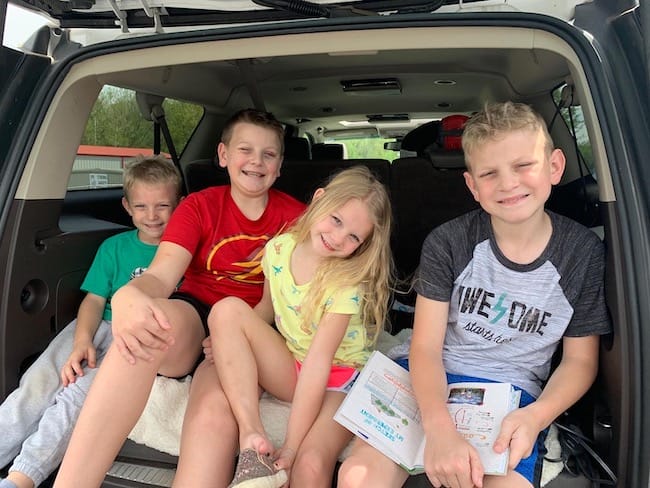

Uh oh...
It appears that you're using a severely outdated version of Safari on Windows. Many features won't work correctly, and functionality can't be guaranteed. Please try viewing this website in Edge, Mozilla, Chrome, or another modern browser. Sorry for any inconvenience this may have caused!
Read More about this safari issue.

My two youngest children eagerly stepped off their Springdale, Arkansas school bus on a Friday last month with a little extra weight in their backpacks. Mixed in with the usual dirt, library books, folders and a few snack crumbs of unknown origin was a packet containing ten days of Arkansas’s Alternative Methods of Instruction assignments, pencils and notebook paper.
My unsuspecting boys had no idea how their lives would change in just a couple of days. None of us did.
The “AMI” acronym has quickly become a household name for Arkansas residents with schoolchildren. The collective assignments represent a provision at the state level that allows districts to have a plan when schools must close due to “exceptional or emergency circumstances.” Collectively thrown into the unfamiliar, teachers, administrators, school support staff and families have scrambled to make the best of the situation.
After Governor Hutchinson’s mid-March weekend announcement closing Arkansas schools to on-site instruction, my children and I haphazardly set up a shared workspace at our dining room table and joined 480,000 public school students across the state in managing a new normal.

Arkansas’s Alternative Methods of Instruction
Schooling on Schedule
After a chaotic first week with two children at home in the Russellville school district, Regina Hamrick recognized the need for a system. She restocked basic school supplies and organized a binder for completed papers. Her son, a middle-schooler, and her daughter, a third-grader, still get up at a specific time and move through a morning routine. They are expected to pack or prepare their lunches each day and work during normal school hours. Breaks and recess are a must. Hamrick goes to her job in the morning but has been able to work from home in the afternoon.
The schoolwork expectations, at first a bit sketchy, became more streamlined. Her children turn in work through Google classroom and participate online in class discussions. Their teachers have consistently checked in, and she directs her children to them before she will attempt to intervene.
Janie Michaelson cares for three children and a niece in the Springdale school district and is handling the education of all four. One of her children is on an individual education plan that drives his special education instruction in school. Another is in the middle of the evaluation process for special services. She appreciates the simplicity of the packets and the modifications teachers have made, but she worries about her children’s learning deficits.
To keep things as simple as she can, Michaelson focuses on reading while also helping the children work through the paper packets of instruction, the only required component for Springdale students. In spite of that, she can’t help but think how working parents, mental health issues in families and a lack of technology for both teachers and students will affect access to additional resources
“I feel internet accessibility will play a large part right now in whether or not kids are really able to thrive.”
Building Fun Into the New School Day
Debi England took time to prep some materials to help support the education of her granddaughter in the Greenland school district, whom she’s now teaching. Those activities, along with the packet of assignments, have made for a full day of learning. Her granddaughter is loving it and congratulated herself for doing so well on her math problems. She even made a request to be homeschooled, a desire England knows will likely fade as the weeks carry on.
“I appreciate all they [the school district] have given us and what has been shared by other parents to help. We are definitely doing outside work, but she loves the programs available on Epic and Prodigy.”

Lindsay March is working with her three children in the Bentonville school district. She appreciates the online organization and the ability for her children to interact on video with their teachers and has found fun in simple things like them participating in their school’s “Disney Dress-Up Day,” the virtual version.
“I feel like getting to see them offers a sense of normalcy in the midst of all this chaos.”
Allen Newberry has a son in elementary school in the Springdale school district and a daughter in a Rogers middle school. Both miss their teachers and classmates but have done well with their schoolwork. He and his wife, Keisha, a middle school teacher in Rogers, haven’t added a lot of other activities into the day. Instead, the children have been cooking and playing outside, both of which he knows are also beneficial.
Keisha Newberry recognizes that supervising schooling at home is far and away different than teaching at school. She makes no plans to homeschool her children anytime soon.
She does point out how interesting it has been to see the approaches to schooling represented by her children in different districts. One has mostly paperwork and a few meetups online. The other has lots of meetings and all electronic work.
“Having my own kids working has also helped me think through the amount of work or engagement I ask from my students. I’ve been able to see how long something that seemed quick can actually take when a student is working from home. I’ve adjusted my own teaching by watching and helping them.”
Allen Newberry hopes that the responsibility each of his children are demonstrating will help them gain some independent skills like learning how to work on their own and manage assignments online; skills he knows will come in handy.
Kacee Brown has four children in the Greenwood School District. They started in on their assignments the first week, and like Hamrick, she created a daily schedule that starts with the morning routine. She has just started taking advantage of the Arkansas PBS programming and resources in her children’s paper packets. Working with grades pre-K to fifth grade on different assignments has been a challenge, especially with the younger ones. Still, she tries to build in plenty of play breaks to take the sting out of the monotony.

Brown has nothing but accolades for her children’s teachers. Between communication online and cards in the mail, they’ve had the best possible interaction as one can expect. She’s even created her own interactive content. Because of her experience reading at the local library, she took the idea to Facebook and now hosts a weekly “Story Time With Mrs. Kacee.”
A business owner with her husband, Brown has now stayed at home while he takes on the responsibilities at their office. It’s a role she doesn’t take for granted. The family leans on their faith in God to help them maintain joy in an uncertain situation.

Join the Conversation
Leave a Comment
2 responses to “AMI: How Arkansas Parents are Making It Work”
 Leave a Reply
Leave a Reply
We do the work.
You check your email.
Sign up for our weekly e-news.
Get stories sent straight to your inbox!













 Leave a Reply
Leave a Reply
[…] teacher or school office to see if they can accept items for teachers at the same time you drop off AMI packets and other schoolwork. Be sure gifts are clearly labeled with the teacher’s […]
[…] responses possible for people across the state: health care, COVID-19 testing, SNAP benefits and Alternative Methods of Instruction for Arkansas […]